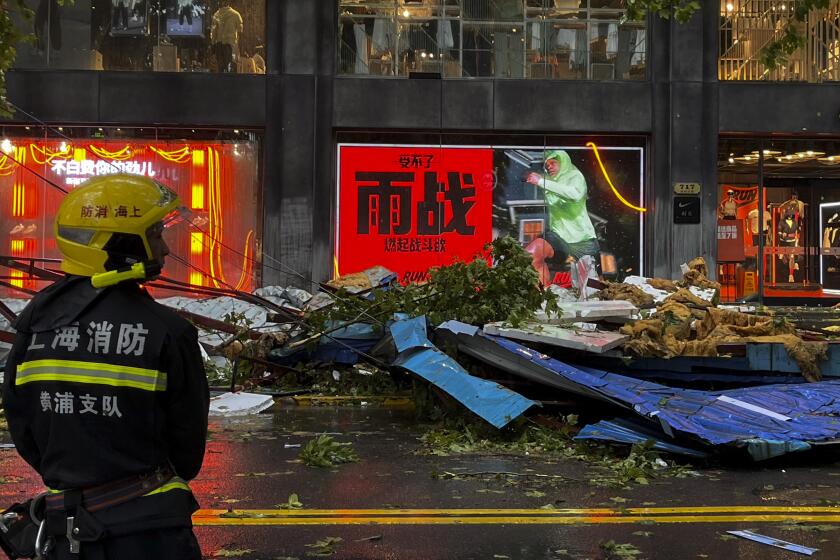Israel and Hamas go back to fighting after 5-hour truce ends

The deaths of four Palestinian boys came as a senior Israeli military official said Wednesday that the likelihood of a ground invasion of the Gaza Strip is “very high.”
Reporting from Jerusalem — Fighting resumed in the Gaza Strip on Thursday after a short and mostly observed humanitarian truce expired, with a fresh volley of rockets from militants and airstrikes by the Israelis amid a flurry of unconfirmed reports a comprehensive cease-fire was imminent.
Rocket fire from Gaza picked up at 3 p.m. as the window closed on a five-hour respite. Gazans used the break to stock up on food, cash and essentials while local authorities tried emergency repairs to water and other services damaged in Israeli airstrikes.
Around 40 rockets were fired from Gaza into Israel in the hours following the brief break. Israeli airstrikes hit four locations in Gaza, and Palestinian reports said that three children were killed.
Talks in Cairo aimed at reaching a longer-term cease fire remained ongoing. Israeli officials declined to comment on media reports that their representatives had returned to Jerusalem to consult with Israeli Prime Minister Benjamin Netanyahu -- or even to confirm the negotiators’ identities, said to be a private envoy, a senior Defense Ministry official and the head of Israel’s domestic security agency Shin Bet.
Even as efforts continued to secure a cease-fire to end the nearly two weeks of fighting, the early morning encounter with more than a dozen militants intercepted at the mouth of a tunnel stretching from Gaza to Israel brought back talk of a possible ground operation to combat such underground passages, which Israel views as a strategic threat.
Hamas’ military branch claimed its special forces had penetrated Israel “beyond enemy lines” and had all returned safely to Gaza. Earlier, the Israeli army said it believed it had killed several guerrillas while others retreated into the tunnel and into the coastal enclave. As Israeli forces continued inspecting the extensive tunnel, it was not immediately clear whether bodies were found.
In some areas of the northern Gaza strip, people were barred from returning home to areas Israel’s military announced previously it planned to attack. In recent days, many thousands remained at United Nations schools and facilities, seeking safety from Israeli strikes.
In a statement issued Thursday, officials with the United Nations Relief and Works Agency said a stash of 20 rockets had been found in one of their vacant schools the previous day during a routine inspection. The agency condemned what it called a “flagrant violation of the inviolability of its premises under international law” that endangered both civilians and staff.
Thursday’s short truce was disrupted after less than three hours when Hamas fired three mortar rounds into Israel, hitting the town of Eshkol, Israel Defense Forces said via Twitter. Israel also responded with mortar fire to an explosion that injured a soldier near the southern Gaza strip.
After the truce ended, sirens sounded in the southern Israel town of Ashkalon to warn residents of incoming rockets or mortars rounds from Gaza.
The pause offered a brief break in the military offensive that has killed at least 220 Palestinians and one Israeli in 10 days.
In Gaza, massive lines formed during the break at banks and ATMs, which opened for the first time in two weeks, and crowds swarmed markets to buy food. Authorities also scrambled to perform repairs on water lines and other infrastructure devastated by Israeli bombing.
The agreement was reached following the deaths of four children killed while playing on a Gaza beach Wednesday in an airstrike Israel’s military said was intended for a Hamas target.
Separately, Israel’s Defense Ministry announced that it recognizes the killing of Mohammed Abu Khdeir, a Palestinian teenager slain in Jerusalem this month, as a terrorist attack, making him a recognized terror victim. The recognition makes his family entitled to certain benefits but also delivers a public and political message.
Abu Khdeir, a 16-year-old high school student, was kidnapped from his Jerusalem neighborhood of Shuafat, beaten and then burned to death in what prosecutors called a crime of racism driven by hatred for Arabs. The suspects reportedly told investigators that they killed him to avenge the killing of three Israeli teenagers in the West Bank in mid-June. The teenager was a random victim.
The three suspected killers were indicted in a Jerusalem court Thursday. The names of the 29-year-old suspect and two minors were not made public.
Sobelman is a special correspondent.
More to Read
Sign up for Essential California
The most important California stories and recommendations in your inbox every morning.
You may occasionally receive promotional content from the Los Angeles Times.









